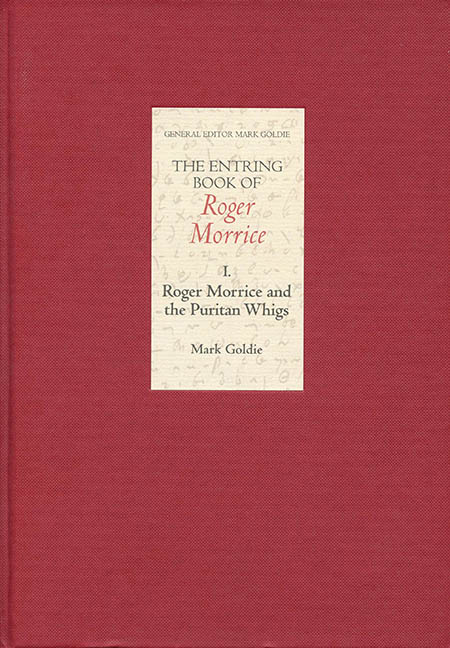Book contents
- Frontmatter
- Contents
- List of Illustrations
- Foreword
- Preface
- Notes on the Editors
- Acknowledgements
- Reader's Guide
- Abbreviations
- Genealogical Tables
- Maps
- Maps
- 1 Politics and Religion in the Era of the Entring Book
- 2 Roger Morrice: Fragments of a Life
- 3 The Text of the Entring Book
- 4 Puritan Whigs
- 5 Country Whigs
- 6 Middle-Way Religion
- 7 The History of the Puritans
- 8 Epilogue: The Entring Book and the Historians
- Appendices
- Bibliography
- Index
- Frontmatter
- Contents
- List of Illustrations
- Foreword
- Preface
- Notes on the Editors
- Acknowledgements
- Reader's Guide
- Abbreviations
- Genealogical Tables
- Maps
- Maps
- 1 Politics and Religion in the Era of the Entring Book
- 2 Roger Morrice: Fragments of a Life
- 3 The Text of the Entring Book
- 4 Puritan Whigs
- 5 Country Whigs
- 6 Middle-Way Religion
- 7 The History of the Puritans
- 8 Epilogue: The Entring Book and the Historians
- Appendices
- Bibliography
- Index
Summary
Puritan politics restored
EVERYTHING we know about Roger Morrice points to a world of Puritan politics. To speak of ‘Puritan politics’ in the era of the Civil War, the 1640s, sits naturally with our historical presuppositions, but to speak of it as a phenomenon equally present in the second crisis of the Stuart century, the 1680s, is less familiar. We tend to suppose that Puritan politics met its nemesis with the restoration of the Stuarts in 1660, and that, if it persisted, it found no place in the mainstream, subsisting only as a marginalised underground movement. By the 1680s we find ourselves using a novel political vocabulary, that of ‘Whig’ and ‘Tory’, at the start of an era historians have called ‘the first age of party’. In this new world of politics, we are used to thinking, great public issues were now detached from the visions of godly rule so zealously and so violently pursued by the militants of mid century. That the Augustans were more secular and pragmatic seems an irresistible view, and if the characteristic aspiration of the seventeenth century was ‘reformation’, that of the eighteenth was ‘improvement’.
It is undoubtedly true that religious sensibilities underwent a profound change, and also true that, by the close of the seventeenth century, England had achieved a political stability unknown in previous decades, a polity in which political differences were increasingly resolved through parliamentary elections rather than through the personal will of monarchs or sedition and rebellion by those who opposed it. The Puritan turned Whig. Yet the argument here is that the Whig still contained the Puritan, and that Puritanism remained at the heart of early Whig politics. The concept of the ‘first age of party’ misleadingly dragoons our historical perspective, for it makes the Restoration, and particularly the Exclusion Crisis, part of the ‘long eighteenth century’, detaching that era from attitudes and political patterns inherited from the Civil War. Yet it is an elementary fact about the 1680s that its politics were conducted under the deep shadow of the Civil War and that its organising conceptions remained those of the 1640s.
- Type
- Chapter
- Information
- The Entring Book of Roger MorriceRoger Morrice and the Puritan Whigs, pp. 148 - 193Publisher: Boydell & BrewerPrint publication year: 2007

